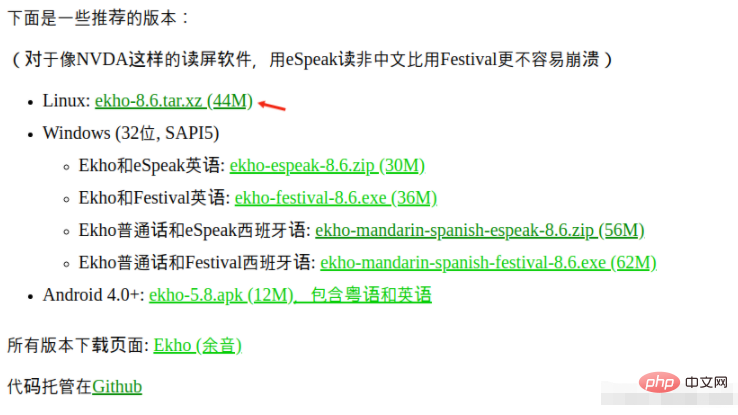Can tts be used in linux?
Can. In Linux, you can use the Ekho software to implement the TTS (text-to-speech) function; you only need to download and install the Ekho software, and you can use the ekho command to convert text to speech, with the syntax "ekho "text"". Ekho is a free, open source Chinese speech synthesis software that supports Linux, Windows and Android platforms.

The operating environment of this tutorial: linux7.3 system, Ekho 8.6, Dell G3 computer.
Linux system implements TTS (text to speech) function
In the process of user interaction software development, voice prompt requirements are often encountered. Voice prompts are a relatively direct way of interaction and can effectively improve user experience. Currently, the more common solutions include Baidu Voice Platform and iFlytek Voice Platform. These platforms generally call online services through APIs. The advantage is that the converted voice is relatively accurate, pronounced by real people, and there are a variety of voice package options. The disadvantage is that it relies on the Internet, cannot be used when the network is disconnected, requires a fee, and has a limit on the number of uses. Of course, you can choose offline SDK development for these platforms. Different platforms provide different SDK platforms. There is currently no support for the embedded arm platform. Of course, if the voice prompts are relatively few and relatively fixed, it is also a simple and fast solution to record the voice first and play the voice file directly when using it.
For the embedded arm platform, the Linux system is used. When there is no network and the voice prompt is uncertain, the TTS engine can only be used to solve the problem. After many searches, I finally found an open source Chinese TTS software Ekho (Yuyin) that is more suitable.
Ekho (Yuyin) is a free, open source Chinese speech synthesis software. It currently supports Cantonese, Mandarin (Mandarin), Guangdong Taishan dialect, Zhao'an Hakka, Tibetan, Yayan (the lingua franca of ancient China) and Korean (under trial), and English is implemented indirectly through eSpeak or Festival. Ekho supports Linux, Windows and Android platforms.
Ekho download address: http://www.eguidedog.net/cn/ekho_cn.php
3.1 Download Ekho

##3.2 Installation Ekho
First install the third-party dependency files. Note that the latest version of ekho relies on the espeak-ng library instead of espeak, which has stopped maintenance.sudo apt-get install espeak-ng libespeak-ng-dev libsndfile1-dev libpulse-dev libncurses5-dev libestools-dev festival-dev libvorbis-dev libmp3lame-dev libdotconf-dev texinfo pulseaudio libpulse-ocaml-dev
3.3 Compile and installtar xJvf ekho-xxx.tar.xz
Copy after login
cd ekho-xxx
Copy after login
./configure
Copy after login
make -j4
Copy after login
sudo make install
Copy after login
Note: Please replace xxx with the specific file path.
##Directly generate voice playbacktar xJvf ekho-xxx.tar.xz
cd ekho-xxx
./configure
make -j4
sudo make install
ekho "你好呀"
pulseaudio -start
Execute ekho "Hello!" again, and you will hear a mechanical voice.
Generate voice filesekho "你好。请继续保持努力!" -o holdon.wav
pulseaudio --start --log-target=syslog
in /etc/rc.local Add
pulseaudio --start --log-target=syslog to the file to set it to start automatically every time you turn on the computer. Related recommendations: "
The above is the detailed content of Can tts be used in linux?. For more information, please follow other related articles on the PHP Chinese website!

Hot AI Tools

Undresser.AI Undress
AI-powered app for creating realistic nude photos

AI Clothes Remover
Online AI tool for removing clothes from photos.

Undress AI Tool
Undress images for free

Clothoff.io
AI clothes remover

AI Hentai Generator
Generate AI Hentai for free.

Hot Article

Hot Tools

Notepad++7.3.1
Easy-to-use and free code editor

SublimeText3 Chinese version
Chinese version, very easy to use

Zend Studio 13.0.1
Powerful PHP integrated development environment

Dreamweaver CS6
Visual web development tools

SublimeText3 Mac version
God-level code editing software (SublimeText3)

Hot Topics
 Android TV Box gets unofficial Ubuntu 24.04 upgrade
Sep 05, 2024 am 06:33 AM
Android TV Box gets unofficial Ubuntu 24.04 upgrade
Sep 05, 2024 am 06:33 AM
For many users, hacking an Android TV box sounds daunting. However, developer Murray R. Van Luyn faced the challenge of looking for suitable alternatives to the Raspberry Pi during the Broadcom chip shortage. His collaborative efforts with the Armbia
 deepseek web version entrance deepseek official website entrance
Feb 19, 2025 pm 04:54 PM
deepseek web version entrance deepseek official website entrance
Feb 19, 2025 pm 04:54 PM
DeepSeek is a powerful intelligent search and analysis tool that provides two access methods: web version and official website. The web version is convenient and efficient, and can be used without installation; the official website provides comprehensive product information, download resources and support services. Whether individuals or corporate users, they can easily obtain and analyze massive data through DeepSeek to improve work efficiency, assist decision-making and promote innovation.
 How to install deepseek
Feb 19, 2025 pm 05:48 PM
How to install deepseek
Feb 19, 2025 pm 05:48 PM
There are many ways to install DeepSeek, including: compile from source (for experienced developers) using precompiled packages (for Windows users) using Docker containers (for most convenient, no need to worry about compatibility) No matter which method you choose, Please read the official documents carefully and prepare them fully to avoid unnecessary trouble.
 BitPie Bitpie wallet app download address
Sep 10, 2024 pm 12:10 PM
BitPie Bitpie wallet app download address
Sep 10, 2024 pm 12:10 PM
How to download BitPie Bitpie Wallet App? The steps are as follows: Search for "BitPie Bitpie Wallet" in the AppStore (Apple devices) or Google Play Store (Android devices). Click the "Get" or "Install" button to download the app. For the computer version, visit the official BitPie wallet website and download the corresponding software package.
 BITGet official website installation (2025 beginner's guide)
Feb 21, 2025 pm 08:42 PM
BITGet official website installation (2025 beginner's guide)
Feb 21, 2025 pm 08:42 PM
BITGet is a cryptocurrency exchange that provides a variety of trading services including spot trading, contract trading and derivatives. Founded in 2018, the exchange is headquartered in Singapore and is committed to providing users with a safe and reliable trading platform. BITGet offers a variety of trading pairs, including BTC/USDT, ETH/USDT and XRP/USDT. Additionally, the exchange has a reputation for security and liquidity and offers a variety of features such as premium order types, leveraged trading and 24/7 customer support.
 Zabbix 3.4 Source code compilation installation
Sep 04, 2024 am 07:32 AM
Zabbix 3.4 Source code compilation installation
Sep 04, 2024 am 07:32 AM
1. Installation environment (Hyper-V virtual machine): $hostnamectlStatichostname:localhost.localdomainIconname:computer-vmChassis:vmMachineID:renwoles1d8743989a40cb81db696400BootID:renwoles272f4aa59935dcdd0d456501Virtualization:microsoftOperatingSystem:CentOS Linux7(Core)CPEOSName:cpe:
 Ouyi okx installation package is directly included
Feb 21, 2025 pm 08:00 PM
Ouyi okx installation package is directly included
Feb 21, 2025 pm 08:00 PM
Ouyi OKX, the world's leading digital asset exchange, has now launched an official installation package to provide a safe and convenient trading experience. The OKX installation package of Ouyi does not need to be accessed through a browser. It can directly install independent applications on the device, creating a stable and efficient trading platform for users. The installation process is simple and easy to understand. Users only need to download the latest version of the installation package and follow the prompts to complete the installation step by step.
 Get the gate.io installation package for free
Feb 21, 2025 pm 08:21 PM
Get the gate.io installation package for free
Feb 21, 2025 pm 08:21 PM
Gate.io is a popular cryptocurrency exchange that users can use by downloading its installation package and installing it on their devices. The steps to obtain the installation package are as follows: Visit the official website of Gate.io, click "Download", select the corresponding operating system (Windows, Mac or Linux), and download the installation package to your computer. It is recommended to temporarily disable antivirus software or firewall during installation to ensure smooth installation. After completion, the user needs to create a Gate.io account to start using it.






